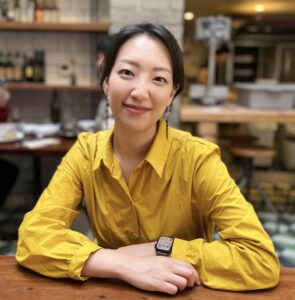Illuminating Humanities: Janet Eunjin Cho

Janet Eunjin Cho, Ph.D. Candidate, Department of History, Texas A&M
The Glasscock Center is excited to continue its series which highlights humanities research at Texas A&M, and the vital role played by the humanities at the university and in the world beyond the academy.
For this highlight, we invite Ph.D. Candidate, Janet Eunjin Cho, to tell us about her experience as a Graduate Residential Fellow (2022-2023) supported by the Glasscock Center.
Janet Eunjin Cho is a doctoral candidate in the English Department at Texas A&M University. Her dissertation, Alimentary Form: Food, Language, and Aesthetics in Contemporary Asian American Women’s Fiction, parses how authors Maxine Hong Kingston, Monique Truong, and Min Jin Lee employ Asian diasporic foodways as transhistorical and transpacific subjects of aesthetic representation to establish minoritarian subjectivities against the colonial, patriarchal, and capitalist imperatives of the twentieth century. Cho’s most recent publication, “Edibles into Scribbles: Writing Asia Through Food in Virginia Woolf’s Orlando: A Biography” is forthcoming in Modern Fiction Studies in Spring 2024.
The Glasscock Center’s new Graduate Residential Fellowship enabled Cho to focus on writing her dissertation. “I desperately needed the time off from teaching…when you have teaching obligations, you barely have time for anything besides preparing for classes,” she explains. During her time as a Graduate Residential Fellow, Cho completed the full draft of her final body chapter and also finalized an upcoming publication.
Cho’s work traces postcolonial ways in which Asian American authors excavate and critique the histories of violence and dispossession inscribed in culinary scenes of labor and consumption. At the same time, she explores how diasporic cooking and eating in such scenes serve less as received markers of colonial dispossession and racial otherness than as reparative sites for reclaiming their unspoken senses of desire, agency, and subjectivity against colonial, patriarchal, and capitalist imperatives. Combining interdisciplinary methods across critical race studies, queer studies, postcolonial studies, and women of color feminisms, her research echoes critical race studies in arguing how representational privilege through language has historically been reserved for white European subjects through the exclusion, domination, and appropriation of non-white, Indigenous, and enslaved populations.
Historically, the aesthetic of taste has played a crucial role in constructing universal “humanness” as defined by one’s knowledge of and ability to appreciate the complexity of European cuisine. The danger of considering Western food as the sole “vibrant matter” in political theorist Jane Bennett’s term is that it only acknowledges those who possess the aesthetic sensibility to appreciate the taste of Western cuisine as human with bodies to taste, feel savor, and even experience the feelings of disgust. In this Eurocentric paradigm, cuisines categorized as non-Western, including Asian cuisine, are labeled as dead matter; therefore, this label grants power to white Western subjects to racialize and dominate non-Western Others as less human where the “less” implies the absence of aesthetic sensibility and agency.
Close analysis of marginalized bodies of indentured cooks, servants, housewives, and peddlers offers compelling insights into the violent and oppressive history in which their traces of labor (but never the labor itself) are removed from the production of lively Western bodies, whose affective capacity determines one’s aesthetic sensibility. For the past decade, Asian American scholars, especially those in the fields of literature and performance studies, turned their interests toward recovering the aesthetic merits of Asian American arts and literature and in resistance to the discourses of Orientalism, cultural authenticity, and racial essentialism.
In her dissertation, Cho develops the term “minority food aesthetics” to capture various narrative forms and patterns in which queer and women Asian migrants vibrantly transform their embodied food memories and practices into alternative modes of communication, including (mis)translation, wordplay, storytelling, and figurative speech. It aims to recover the sense of humanity and agency of marginalized Asian diasporas, previously violently erased by their impaired relationship with the dominant language, at the intersection of history, politics, and aesthetics. Cho’s future projects will extend her concept of “minority food aesthetic” by incorporating a more diverse body of literature that can illuminate the various embodiments of matters and practices across racial and ethnic boundaries of other minoritized groups.
Cho finds her work most rewarding when it reaches a broader audience who are not necessarily from her discipline, specifically highlighting the importance of these interactions in a classroom setting. In her experience, students from minoritized backgrounds, especially those who are 1.5 or second-generation immigrants, rarely had the chance while growing up to read texts written by authors who look like them, speak in their mother language, and have undergone similar life stages as immigrants. Students feel encouraged to move beyond the text and bring their own stories of struggle and survival to the class when they can personally identify with the material. Their stories create new forms of knowledge that deserve the same—or perhaps even more—amount of attentiveness and urgency that we put into reading literary and theoretical texts.
“To be given space and time to tell one’s story is a privilege for some,” Cho says. “I hope my work can contribute to creating and expanding that ground so that more voices can be patiently heard by others and rightly represented.”
